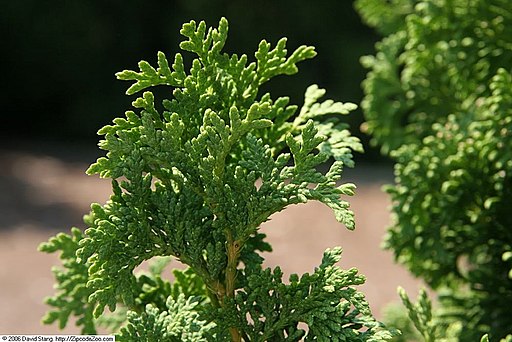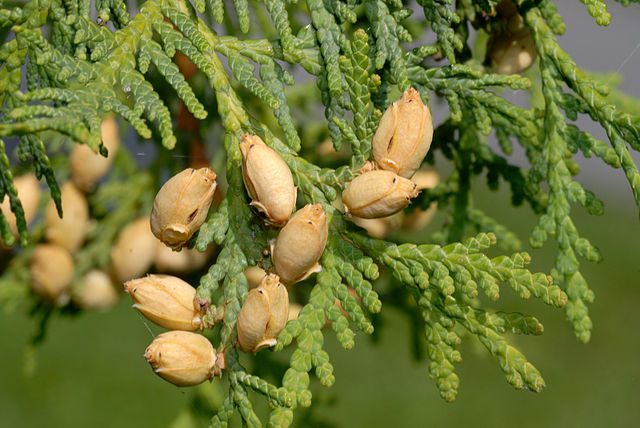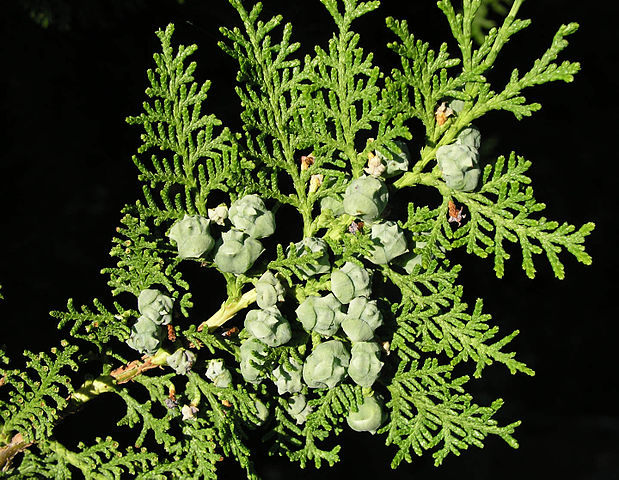Have you heard of Thuja?
There are numerous benefits of thuja that have been widely studied!
Thuja is now being used as a natural remedy for many health concerns. It is an herb that has been used for centuries in natural medicine for a variety of ailments. Its name comes from the Latin word for “life” and is often referred to as “the tree of life.”
Let’s dive into the many benefits of thuja, and what it can do for your health and well-being.
The Benefits Of Thuja
Thuja contains several active compounds that are beneficial for human health, including flavonoids, tannins, and essential oils.
These compounds have anti-inflammatory, antimicrobial, antifungal, antiviral, antioxidant and analgesic properties that make thuja incredibly useful in treating a variety of conditions.
Studies have shown that thuja may be effective in treating many conditions
- skin conditions, such as eczema or psoriasis
- respiratory issues, such as bronchitis or asthma
- digestive problems like constipation or diarrhea
- joint pain
- insomnia
- stress
- depression
- headaches
- muscle aches
- colds and flu
- menstrual cramps
- and even cancer
As you can see there are so many potential uses for this amazing plant!
Unlocking the Benefits of Thuja for Your Health and Well-Being
This potent natural remedy has been used for centuries to improve various aspects of health and well-being.

Photo by David J. Stang, CC BY-SA 4.0, via Wikimedia Commons
Thuja For Pain
Taking thuja for pain may seem a bit strange, but the reality is that this herbal remedy could be the difference between whether your discomfort continues, or is alleviated. Really!
Thuja has been used to successfully treat various forms of muscular and joint pain, including tennis elbow pain, rheumatic arthritis — and sciatica, which is my pain point.
It’s made from extracts of thuja occidentalils (or white cedar), which is a traditional remedy practiced by native Americans for centuries.
As an herbal alternative to chemically-based drugs, like ibuprofen or oxycodone (ugh!), thuja offers a gentler approach with fewer side effects such as upset stomachs, headaches or a weak immune system – all fairly common reactions to many pharmaceutical pain relievers.
If you prefer avoiding the overuse of medicinal pharmaceuticals, natural solutions like thuja might be worth considering.
Get an Energy Boost
The last major benefit of thuja is its ability to increase energy levels in those who use it regularly.
The herb contains compounds that can help regulate hormones, which can have a positive effect on energy levels. Additionally, some studies have shown that thuja has calming effects on the mind, which may also contribute to increased energy levels throughout the day.
Immunity Support
Thuja is also known to be great for boosting immunity levels due to its high content of antioxidants. These antioxidants help protect your cells from damage caused by free radicals, which are unstable molecules that cause oxidative stress in your body.
By reducing oxidative stress, thuja can help improve your overall health and reduce your risk of developing other illnesses or diseases.
Digestion Issues
Thuja has been used for centuries as an aid in digestive issues, such as indigestion and bloating.
The plant contains compounds that help stimulate the production of digestive juices, which helps food travel more efficiently through your body and promotes better absorption of nutrients.
Plus, thuja can help reduce inflammation in the gastrointestinal tract, which may provide relief from uncomfortable symptoms, such as cramping and abdominal pain.

André Karwath aka Aka, CC BY-SA 2.5, via Wikimedia Commons
Thuja also combats stress, depression and insomnia
Since it’s all natural, with no known adverse side effects, thuja has become increasingly popular as an alternative to synthetic drugs that are often used to treat stress-related disorders.
The extract of thuja helps the body find balance and can provide calming relief from stress and sleeplessness by stimulating the body’s own self-healing capabilities. In addition to treating stress, depression and insomnia, thuja can also help with anxiety and nervousness.
With its natural anti-inflammatory qualities, Thuja works to reduce irritation in the brain and has proven to be successful in restoring normal mental functioning.
Whether you are feeling overwhelmed or looking for a solution to help you fall asleep at night, thuja might just be the right choice.
Lastly, the Benefits of Thuja for Cancer
As a natural solution to cancer, thuja has been gaining a lot of attention lately. Thuja is believed to be highly effective in treating various forms of cancer due to its strong anti-inflammatory and antiviral properties.
Additionally, it helps boost immune function, soothe pain, reduce inflammation, decrease the size of tumors, increase energy levels and protect against further damage caused by cancer cell growth.
So, What is Thuja?
Thuja is an evergreen coniferous tree native to North America, Europe, and Asia.
It has been used in traditional medicine since at least the 16th century, but its popularity began to decline in the 20th century with the rise of conventional pharmaceuticals. Today, however, thuja has seen a resurgence as people are looking to natural remedies to improve their health and well-being.
How To Use Thuja
Thuja’s incredible healing powers can be harnessed in a variety of ways!
Tea: You can take it orally by drinking tea made from dried leaves or capsules filled with ground leaves or extract.
Ointment: You can also apply it topically on affected areas by making a salve or ointment using the essential oil extracted from the leaves or bark of thuja trees.
Essential Oil: You can also find relief from inhaling vapors produced adding a few drops of essential oil to boiling water and inhaling the steam vapors produced by this method.
Cooking: (see the culinary section below if you’re interested).
And there you go!
Precautions and Potential Side Effects of Thuja
When considering Thuja as a possible remedy, it’s important to take certain precautions and be aware of potential side effects.
Although it is considered generally safe, an improper dosage or too frequent correspondence may produce side effects such as headaches, dizziness, nausea, heartburn and many others.
According to some medical studies, long-term use of Thuja can even reduce the effectiveness of other medicines taken in combination. That’s why it is always advisable to consult with a qualified physician before taking any dietary supplement – especially one as potent as Thuja.
However, if taken in recommended doses and frequency, Thuja can be a powerful natural ally for improving our physical and psychological well-being.
In Conclusion: Thuja is an incredibly beneficial natural remedy with many positive health benefits. From aiding in digestion issues to boosting energy levels and improving immunity support, it’s no wonder why this ancient herb has been used for centuries. If you’re looking for a safe way to improve your health and well-being naturally, this could be the one.
Culinary applications – Yes, I got side tracked because…
Thuja is full of surprises! It even makes for an exciting addition to any meal! It has a unique taste that must be experienced to be fully appreciated…
It has an intense, slightly bitter flavor which is why it often pairs well with bolder dishes and strong flavors. For example, it can be used to compliment hearty braised short ribs or pulled pork sandwiches, as the robust tastes work together in perfect harmony.
Thuja also has wonderful flavor profiles when added to prawns, asparagus, mushrooms and roasted root vegetables.
Fresh thuja also imparts an interesting yet delightful creaminess when mixed into sauces such as Hollandaise or béarnaise.
However, herbs like Thuja can be difficult to find (believe me!). So here are some herb flavor alternatives…
Sage is a wonderfully versatile herb that I included in my culinary herbs post. If you are looking for a flavor similar to Thuja, it is similar, as it has slightly bitter and peppery notes. (In my experience, it’s easy to overdo it with sage, so you might want to go a bit on the sparing side.)
Dandelion root has also been used for centuries for its healing properties, and when brewing tea with dandelion root, it can also bring an earthy flavor with herbal hints of anise.
Yarrow, which enhances wound healing, is another great culinary substitution due to the subtle woodsy taste reminding one of thyme or oregano.
Lastly, rosemary is a popular alternative to Thuja because of its mild pine-like artisanal touch.

